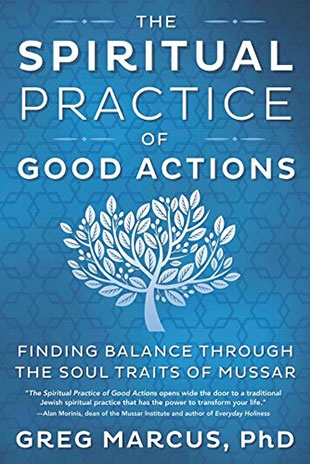Greg Marcus is an innovative Mussar maven and the creator of American Mussar, a twenty-first century spiritual practice for an authentic and meaningful life. He is a graduate of the Mussar Institute's Facilitator Training Program. Marcus offers guidance on how to lead a life of mindful harmony and spiritual integrity. Visit him online at www.AmericanMussar.com.
The Jewish spiritual practice of Mussar was developed in Lithuania in the second half of the nineteenth century by Rabbi Yisrael Lipkin Salanter. The word means "correction" or "instruction" and is also the simple modern Hebrew word for ethics. You don't have to be Jewish to appreciate or practice this path to refining and elevating your inner life and outward actions. Here is a sturdy and substantive spiritual curriculum that nourishes the soul and provides a plethora of practices that will bring more balance, happiness, trust, and love into your life.
Marcus defines Mussar as "a practice, a means to internalize Jewish values to live a more ethical, meaningful, and authentic life." It aims to help you refine your character and conduct in everyday life. Here are bedrock principles of Mussar:
- We all share the same soul traits and have a unique measure of each.
- We all carry a Divine Spark that is occluded by our baggage.
- We all have free will but it is not always accessible.
- We are all driven by a conflict between good inclination and evil inclination.
In his explanations of 13 soul traits, Marcus begins with humility, which occupies a place between arrogance and self-abnegation. He moves on to patience, enthusiasm, trust, loving-kindness, truth, honor, gratitude, order, silence, equanimity, fear of consequences, and awe of majesty.
At the end of each chapter on these traits, he offers a mantra, observations, suggestions for journal work, and specific actions to take. To amplify our understanding of how the soul traits show up in everyday life, he includes quotes from famous writers, references to Jewish tradition, and descriptions of scenes from movies.
We very much appreciated Marcus's inclusion of the following practice under the journal section for patience. It comes to us from Rabbi Nachman of Breslov (1772 – 1811): "Get into the habit of always singing a tune. It will give you a new life and send joy into your soul." We loved his definition of enthusiasm as the energy that drives us to action; too little of it results in sloth and too much of it devolves into frantic busyness. We agreed with his placement of the movie Pay It Forward in his commentary on Loving-Kindness. In the last chapter on Awe of Majesty, we relished Marcus's discussion of it as a source of wisdom and the keystone soul trait.
